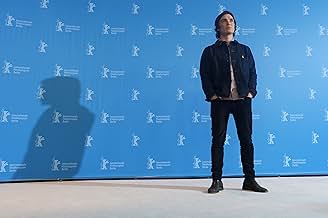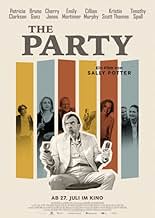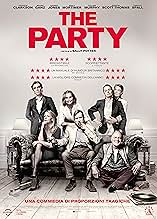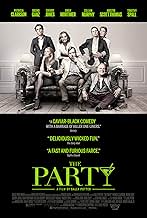Janet hosts a party to celebrate her new promotion, but once the guests arrive, it becomes clear that not everything will be going down as smoothly as the red wine.Janet hosts a party to celebrate her new promotion, but once the guests arrive, it becomes clear that not everything will be going down as smoothly as the red wine.Janet hosts a party to celebrate her new promotion, but once the guests arrive, it becomes clear that not everything will be going down as smoothly as the red wine.
- Director
- Writers
- Stars
- Awards
- 5 wins & 9 nominations total
- Director
- Writers
- All cast & crew
- Production, box office & more at IMDbPro
Featured reviews
I only watched this because of Cillian Murphy, and wasn't expecting much. The trailers made it look okay, and I don't really think a lot of comedy movies are actually funny. Well, I was surprised! I was laughing the whole time, and wished it was longer. Cillian's acting is taken to a new level in this movie, beyond what I had seen from him in the past. He was definitely the best character. Even the political humor made me laugh. The plot was also very good and interesting. The characters each add different types of comedy to the movie, and the dialogue is well written. I am excited to watch this movie again!
The story of 'The Party' was unbeknownst to me upon my viewing of the film. All I knew was that it is directed by British Auteur Sally Potter and stars Kristen Scott Thomas, Timothy Spall and Cillian Murphy, which is the extent of context I will divulge here as I feel it is better to watch this film knowing very little about its narrative.
Although simplistic in its base narrative, underneath 'The Party' is a short, snappy, satirical view on the modern day socio-political climate. It paints the modern system of politics as ineffective at implementing change, suggesting a more immediate method is required in this day and age to keep up with such a rapidly changing world. The film succeeds and does this effectively through witty dialogue, articulately crafted Mise en Scene and a comedic narrative progression.
The narrative progression I refer to is the advancement of the characters into pure chaos after the guise of 'polite society' is stripped away, revealing the hypocrisy behind its ideals and presentation. This chaos is the crux of the film as it magnificently illustrates the futility of the mask that the upper class have created for themselves, which the film heightens through comedic elements giving the film a heavily satirical atmosphere.
Furthermore, the films caricatured characters play a crucial role in conveying the film's message as many of them are hypocrites, their real faces hiding behind the mask of what 'polite society' expects to see, with costume being cleverly utilised to convey to us the true thoughts and feelings of many of the characters whilst simultaneously acting as a red herring in some circumstances, illustrating how we cannot always know whether or not people are truly what they present themselves as, linking to another key message the film discusses: distrust in the political landscape.
However, although the film has a profound message, it suffers from being very simplistic on its surface. The story is cliché and predictable with a couple of drawn out dull moments, with the real meat of the film laying underneath, and whilst this is the case for most films, the surface has to be captivating at the same time in order to engage the audience. In this sense 'The Party' could be potentially divisive for audiences as the film runs the risk of appearing pretentious and dull for some viewers, which I can confirm as many left my screening of the film verbally disgruntled.
In conclusion, 'The Party' is an incredibly humorous, satirical take on modern day society's political landscape as well as the hypocrisy of 'polite society' and its bloated sense of self righteousness. Although it has its flaws, 'The Party' is a highly entertaining film with a punchy message that really sticks with you after you've left the theatre: indecision is the face of modern day politics, and that desperately needs to change.
Although simplistic in its base narrative, underneath 'The Party' is a short, snappy, satirical view on the modern day socio-political climate. It paints the modern system of politics as ineffective at implementing change, suggesting a more immediate method is required in this day and age to keep up with such a rapidly changing world. The film succeeds and does this effectively through witty dialogue, articulately crafted Mise en Scene and a comedic narrative progression.
The narrative progression I refer to is the advancement of the characters into pure chaos after the guise of 'polite society' is stripped away, revealing the hypocrisy behind its ideals and presentation. This chaos is the crux of the film as it magnificently illustrates the futility of the mask that the upper class have created for themselves, which the film heightens through comedic elements giving the film a heavily satirical atmosphere.
Furthermore, the films caricatured characters play a crucial role in conveying the film's message as many of them are hypocrites, their real faces hiding behind the mask of what 'polite society' expects to see, with costume being cleverly utilised to convey to us the true thoughts and feelings of many of the characters whilst simultaneously acting as a red herring in some circumstances, illustrating how we cannot always know whether or not people are truly what they present themselves as, linking to another key message the film discusses: distrust in the political landscape.
However, although the film has a profound message, it suffers from being very simplistic on its surface. The story is cliché and predictable with a couple of drawn out dull moments, with the real meat of the film laying underneath, and whilst this is the case for most films, the surface has to be captivating at the same time in order to engage the audience. In this sense 'The Party' could be potentially divisive for audiences as the film runs the risk of appearing pretentious and dull for some viewers, which I can confirm as many left my screening of the film verbally disgruntled.
In conclusion, 'The Party' is an incredibly humorous, satirical take on modern day society's political landscape as well as the hypocrisy of 'polite society' and its bloated sense of self righteousness. Although it has its flaws, 'The Party' is a highly entertaining film with a punchy message that really sticks with you after you've left the theatre: indecision is the face of modern day politics, and that desperately needs to change.
Stellar performances, 9/10 script (there is a little bit lacking in the ending), and an overall likability to all the characters. For the first time in a long time I felt like I needed to post a review, because it felt like my view wasn't represented. If you liked Carnage, this is for you: This is a tightly wound, small play, made for screen. The bonus of having close-ups and a definitive, select final cut, made this a real treat.
Shot in black and white and clocking in at just over an hour, it is one of the more original movies coming out of the Berlinale. Several elements stand out, like the production design by Carlos Conti (37°2 le matin) with its odd, detached feeling bringing to the movie, but also the daring cinematography by Aleksei Rodionov (Idi I smotri, Orlando!) combined with good editing makes the movie work.
So nice work in all sectors, but basically it is the actors who have to carry through in this dark comedy, somewhat difficult to define: Third screwball, third Woody Allen, and a third Britcom but definitely with a style of its own.
Potter herself gave the best synopsis by calling it a movie about ideals and convictions getting tested in a crisis situation. The really good script lines are dispersed among the excellent cast, although I do have a weakness for the role of Timothy Spall, such a great and modest actor, gripping the movie from the start onwards.
Why not rate this higher? I think it lacks a really great ambition, it is a nice ensemble piece, but despite the good things feels somewhat empty, more entertainment than art. The sum of the parts just doesn't add up enough for me, which often means the difference between OK and excellent.
So nice work in all sectors, but basically it is the actors who have to carry through in this dark comedy, somewhat difficult to define: Third screwball, third Woody Allen, and a third Britcom but definitely with a style of its own.
Potter herself gave the best synopsis by calling it a movie about ideals and convictions getting tested in a crisis situation. The really good script lines are dispersed among the excellent cast, although I do have a weakness for the role of Timothy Spall, such a great and modest actor, gripping the movie from the start onwards.
Why not rate this higher? I think it lacks a really great ambition, it is a nice ensemble piece, but despite the good things feels somewhat empty, more entertainment than art. The sum of the parts just doesn't add up enough for me, which often means the difference between OK and excellent.
The middle-class dinner party in which the thin veneer of polite society is ripped away to expose the dog-eat-dog savagery underneath has provided ample fodder for playwrights since probably the birth of theatre, but films in which such a gathering is the sole focus are rarer. So step forward British auteur Sally Potter.
Having been appointed Shadow Minister for Health, Janet (Kristen Scott Thomas) and her husband Bill (Timothy Spall) throw a celebratory dinner party for their friends: the acerbic April (Patricia Clarkson) and (played by Bruno Ganz) her new age partner Gottfried ("prick an aromatherapist and you'll find a fascist" says April); lesbian professor Martha and her 'Masterchef' runner-up partner Jinny (Emily Mortimer), who is carrying their purchased foetuses ("babies are born every day, in large numbers - large enough to put our planet at risk" is April's unsentimental but accurate comment). Banker Tom (Cillian Murphy) arrives with his wife's apologies: she will be along later. Thus the stage is set, but when a champagne cork shatters a window it is an omen that this will be a dinner party none of the attendees will soon forget.
Trendy lefties who spend too much time thinking are an open goal when it comes to comedy, with their talk of 'post-post-feminism' and their professorships in Utopian Americanism, and Potter does not miss the target in her - I suspect affectionate - mickey-taking. There is nothing original in this - not even the 'twist' at the end - but the film is so entertaining that does not matter (with one exception: when banker Tom heads to the bathroom to snort cocaine I rolled my eyes - just once I would like to see a fictional young banker who *does not* have a coke habit: don't any of them simply put the kettle on?)
There is good acting all around: Clarkson gets all the best lines - albeit at the expense of depth of character - but that merely makes the others work harder with the lines they have been given. Thomas, whose character is the most fully-formed, is noteworthy.
At just over seventy minutes this is rather a short film. Quite why Potter decided to make it in black-and-white I do not know - extra filmsnob points I suppose. But it is hugely entertaining and I look forward to seeing it again. (After all, any film which lists in the credits 'production dog' *must* be good!)
Having been appointed Shadow Minister for Health, Janet (Kristen Scott Thomas) and her husband Bill (Timothy Spall) throw a celebratory dinner party for their friends: the acerbic April (Patricia Clarkson) and (played by Bruno Ganz) her new age partner Gottfried ("prick an aromatherapist and you'll find a fascist" says April); lesbian professor Martha and her 'Masterchef' runner-up partner Jinny (Emily Mortimer), who is carrying their purchased foetuses ("babies are born every day, in large numbers - large enough to put our planet at risk" is April's unsentimental but accurate comment). Banker Tom (Cillian Murphy) arrives with his wife's apologies: she will be along later. Thus the stage is set, but when a champagne cork shatters a window it is an omen that this will be a dinner party none of the attendees will soon forget.
Trendy lefties who spend too much time thinking are an open goal when it comes to comedy, with their talk of 'post-post-feminism' and their professorships in Utopian Americanism, and Potter does not miss the target in her - I suspect affectionate - mickey-taking. There is nothing original in this - not even the 'twist' at the end - but the film is so entertaining that does not matter (with one exception: when banker Tom heads to the bathroom to snort cocaine I rolled my eyes - just once I would like to see a fictional young banker who *does not* have a coke habit: don't any of them simply put the kettle on?)
There is good acting all around: Clarkson gets all the best lines - albeit at the expense of depth of character - but that merely makes the others work harder with the lines they have been given. Thomas, whose character is the most fully-formed, is noteworthy.
At just over seventy minutes this is rather a short film. Quite why Potter decided to make it in black-and-white I do not know - extra filmsnob points I suppose. But it is hugely entertaining and I look forward to seeing it again. (After all, any film which lists in the credits 'production dog' *must* be good!)
Did you know
- TriviaThe majority of this movie was filmed sequentially.
- ConnectionsFeatured in Premios Goya 33 edición (2019)
- SoundtracksJerusalem
Performed by Fred Frith
Written by Hubert Parry
Arranged by Fred Frith & Sally Potter
Published by Copyright Control
- How long is The Party?Powered by Alexa
Details
Box office
- Gross US & Canada
- $749,827
- Opening weekend US & Canada
- $37,396
- Feb 18, 2018
- Gross worldwide
- $5,597,950
- Runtime1 hour 11 minutes
- Color
- Aspect ratio
- 2.35 : 1
Contribute to this page
Suggest an edit or add missing content


































